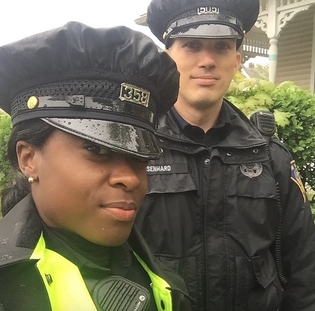 loading
loading
FindingsCreating connectionCan house calls by police help build trust?  New Haven IndependentNew Haven police officers Jasmine Sanders and Eric Eisenhard in a 2016 photo. View full imageCan an informal visit help improve relationships between police officers and the communities they serve? The answer, a Yale study suggests, may be yes. The researchers trained two officers from each New Haven district to make brief, friendly, unannounced home visits, “just to say hello and check in.” Community participants were selected based on whether they had returned a survey mailed to about 50,000 households. Half of the 2,013 respondents received the home visit; the other half did not. Of those visited, officers made contact with 412. They introduced themselves, asked about neighborhood concerns, and provided cards with their work phone numbers. Three days later, and again 21 days later, both groups took follow-up surveys that measured their views of police across four categories: legitimacy, perceived effectiveness, cooperation, and compliance. The results showed that the visits improved respondents’ perspectives on police, particularly in legitimacy and effectiveness, and reduced negative beliefs about police officers as a group. The strongest positive effect showed among black and Latinx residents, who had tended to hold the most negative views. Peyton notes that the police officers, too, reported positive experiences. “This intervention shows the substantial benefits of a relatively simple—and very low-cost—change to police behavior,” Peyton says.
The comment period has expired.
|
|